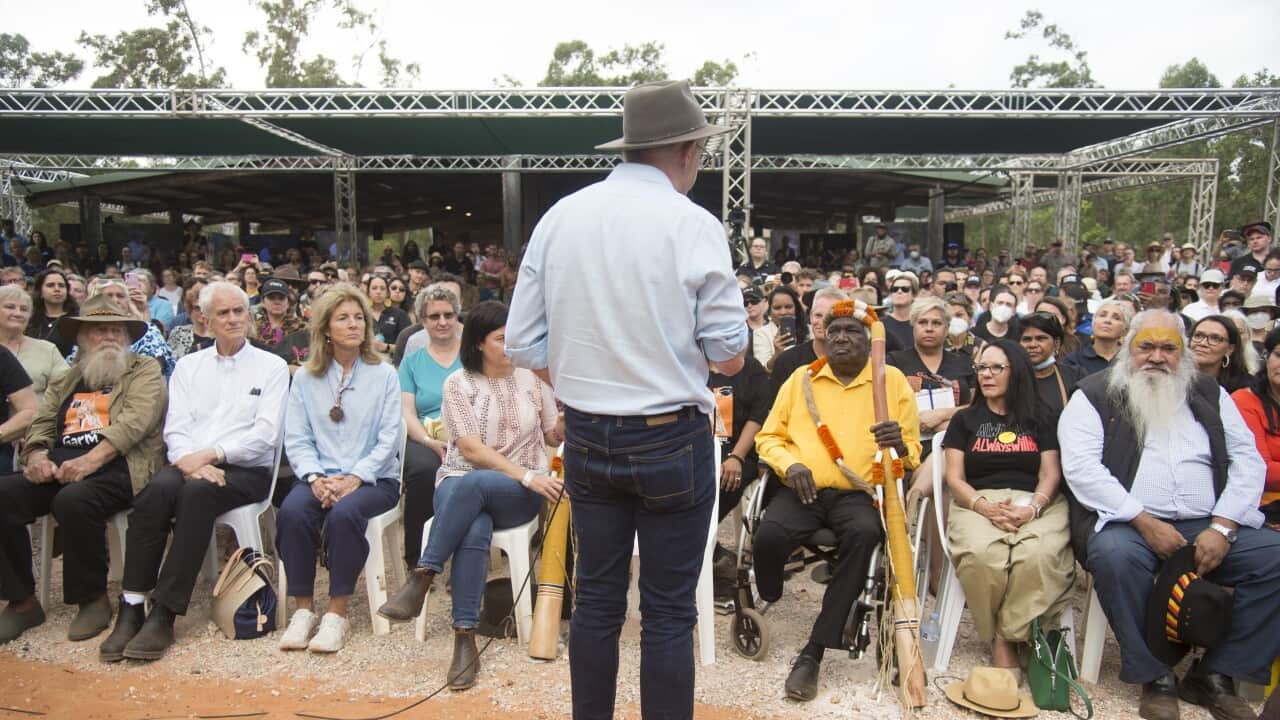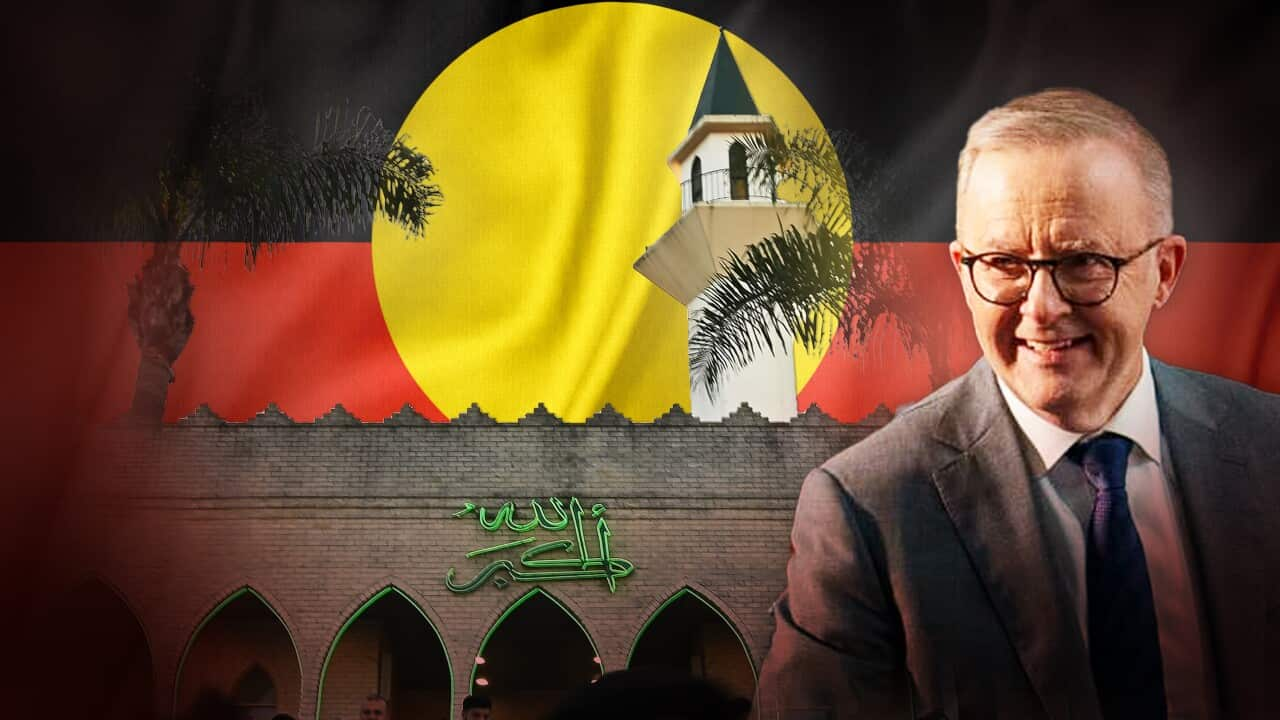KEY POINTS:
- Australians will vote on a First Nations Voice to Parliament this year.
- It will be Australia's first referendum since 1999.
- An architect of the Uluru Statement from the Heart answers key criticisms of proposal.
This year, Australians will be asked to enshrine a First Nations Voice to Parliament in the Constitution in the country's first referendum since 1999.
The Voice, first suggested in the , would advise politicians on policies relating to First Nations Australians, but won't have the power to override federal parliament.
Parliament has rubber-stamped the wording of the question Australians will answer:
A proposed law: to alter the Constitution to recognise the First Peoples of Australia by establishing an Aboriginal and Torres Strait Islander Voice. Do you approve this alteration?
The Uluru Statement says the Voice would be followed by a Makarrata - or Treaty - commission, and would also oversee a process for truth-telling about Australia's colonial history.
But ahead of this year's vote, a number of questions are being raised. How much will we know about the Voice on referendum day, how will it function, and whose voice will it actually represent?

Professor Megan Davis was one of the architects of the Uluru Statement from the Heart. Source: AAP / Lukas Coch
Speaking to SBS News, she answers those questions.
There's not enough detail
“The Australian public won’t vote for something the prime minister refuses to explain. Release the detail ... This would be the respectful thing to do, instead of keeping Australians in the dark." - Peter Dutton, Coalition leader, January 2023.
Professor Davis: “There is substantial detail publicly available around the contours of what a Voice will look like. There are three working groups involving almost a hundred First Nations people working on that detail, and it will be released at the appropriate time, when the Referendum Bill is ready to be passed in the parliament. There's also three very important pre-referendum reports that provide information. Some of them are very long reports, so most Australians probably won't read [them]. But they do exist.”

Opposition leader Peter Dutton says he wants more detail on the proposal. Source: AAP / Darren England
The Voice would represent the elite
“Unfortunately, this Voice model is about empowering the elites, it’s about a transfer of power and nothing more than that.” - Jacinta Nampijinpa Price, Warlpiri/Celtic woman and Nationals senator, November 2022.
Professor Davis: “Nothing could be further from the truth. It's about providing a much more democratic approach to the ways in which policy and laws are passed about First Nations peoples. The dialogues were run in 13 sites across Australia. One of the key principles was that those who came into the dialogues had to be people who didn't have a voice. By and large, people who get into Parliament House to lobby politicians, people who held positions like CEOs, and Aboriginal politicians … were not allowed to participate in this process. They have a voice. So the idea of a Voice to Parliament is anything but elitist.”
We don't need to have a referendum
"There is a very big difference between enshrining something in the constitution and putting it into legislation, which the prime minister could do tomorrow. The laws can be changed if it doesn’t work [or] if it turns out to be a disaster." - Peter Dutton, Coalition leader, January 2023.
Professor Davis: “It has to be enshrined in the constitution for it ... to be permanent. There's been successive First Nations bodies, but they've all been abolished. One of the reasons for the dislocation of many mobs from Australian society, one of the reasons for the huge disparity in advantage between non-Indigenous and Indigenous Australians, is the lack of a durable and sustainable voice to the government of the day."

Country Liberal Party senator Jacinta Price claims the Voice would represent the elites. Source: AAP / Mick Tsikas
The Voice is just a symbol
"What [Indigenous Australians] are looking for is practical action, not symbolism." - David Littleproud, Nationals leader, August 2022.
Professor Davis: “[The Voice] is a really substantive reform. What we know from the Uluru Statement from the Heart is that all of the dialogues rejected symbolism as being an appropriate form of recognition. What the Voice will involve is our people being brought to the table when laws and policies are made about our life. It's a very tactile, pragmatic reform that will empower our people to actively participate in the democratic decision-making of the state.”

Former Greens senator Lidia Thorpe has raised concerns over sovereignty. Source: AAP / Lukas Coch
It could slow down the process of truth-telling and treaty, or stop it altogether
"There is also a - not unreasonable - fear that progress on the Uluru Statement will stop at the Voice, and that the equally important Truth and Treaty aspects will not be progressed with any urgency." - Brad Pettit, WA Greens MP, in The West Australian, February 2023.
Professor Davis: “The Uluru Statement really put this sequence of Voice, Treaty, Truth on the table. We weren't talking about truth-telling until then. That sequence was provided because that's the way in which Australia's constitutional system works. Across the continent, there are [already] truth-telling processes and treaty-making processes in states and territories. So it's an erroneous assertion to make.”
The Voice could cede Indigenous sovereignty
"Labor can say whatever they like, but … I have not [been] guaranteed our sovereignty will not be ceded." - Lidia Thorpe, DjabWurrung, Gunnai & Gunditjmara woman and independent senator, January 2023.
Professor Davis: "That argument is very difficult to understand, given that the arrivals in 1788 didn't lead to a ceding of sovereignty, the passage of the Australian Constitution in 1901 didn't cede their sovereignty. First Nations people have their sovereignty...we are sovereign people. No one can cede that sovereignty unless we do it ourselves."










